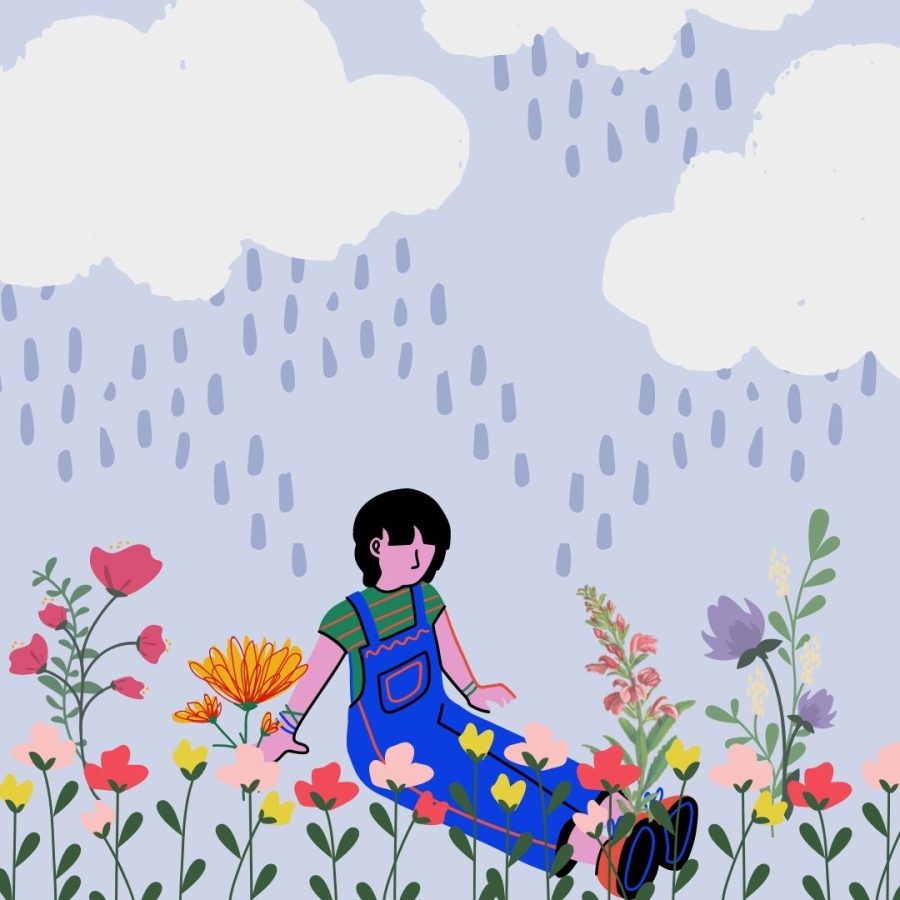Before I could bloom, I needed to learn how to grow
Perfectionism and self criticism led me to burnout and struggles with mental health.
Junior year for me has been anything but a high school dream. In late November of 2021, I felt like I was strapped to a fast moving roller coaster, speeding towards a dark tunnel of what comes after high school. I felt like I needed to succeed at everything: classes, extracurriculars, volunteering, writing. When I turned in my National Honor Society application, I felt like it was empty, filled with nothing but blank spaces. They screamed at me from the Google Document: “Why have you not done more?”, “What are you doing with your life?”, “Why can you not be better?”
I looked at others and their lives and it looks like they are doing so much better than me. I do not have social media, but I still compared myself to others just through talking and glimpses of their lives. Everyone seemed busier, more productive, and better at life than I was. I felt like I was stuck in place, glued to the floor while everyone around me moved at full speed.
At one point, I simply stopped trying. If I could not keep up with others, why did I even try? I stayed up late, spiraling in my thoughts. Why was I not doing more? These thoughts led to doubts about relationships and friendships. Everything in my life seemed pointless. I could not understand why I tried so hard. Everything would be dust in the end, forgotten in the backstreets of time.
Perfectionism and mental burnout has been well studied in every age, from gifted and talented children to adults. In a study published in Frontiers in Psychology, researchers found that “…self-defeating aspects of excessive self-criticisms, such as regularly evaluating the self’s performance to reach standards as inadequate, render individuals vulnerable to stress.” Negative self depreciation and personally criticizing yourself for “not being good enough” can lead to significant burnout and stress problems, especially among young adults.
Deep in this rut of perfectionism, I asked myself, “Why did I feel like this?” Why could I not simply be content with being? I felt like every waking moment I needed to do something productive, otherwise I was wasting the opportunities I had been given. When I filled my schedule to the brim, it felt like I was drowning in all the tasks I had to complete, but I did not feel useless.
Erin Cech, a sociologist at the University of Michigan, says that this type of guilt about being unproductive is rooted deep inside our cultural norm. “The notion of productivity as a sense of self-worth is a social construct of our cultural space,” he said in an article by Business Insider. In America, we are taught that our goal is to be productive, to work, and to add something to society. Americans work 19% more hours than the average European, which averages out to around 258 extra hours per year. The idea that our self worth is directly linked to our productivity is an idea that is extremely detrimental to mental and physical health, but it is also an idea that is rooted deep into our society.
I had a nasty cold back in late November and I was required to stay home from school due to COVID-19 guidelines. I remember sitting in my room, going crazy with how guilty I felt that I was resting. I searched “Is it okay to rest when you’re sick?” The answer was yes, of course. But I felt so guilty for taking a break that I needed someone to tell me. This past week, I got sick again, and again, the feeling of guilt returned. But this time I messaged a friend instead of stewing in my own head about how awful I felt. They told me to stay in bed, and to feel better. They told me that they loved me and they did not care if I canceled plans or took a few days off to feel better. My health was worth more to them than anything we had planned beforehand.
I realized that I needed to become okay with mediocrity. I was doing my best, that was all anyone could ask of me. I was not on this Earth to be productive all the time, to contribute and add to the world in huge, magnificent ways. I simply needed to take care of and love others. If I did that, then it would be enough. No one can work 100% all the time. If I could even work 10% in a day, that would be extraordinary for me. When you are stuck at zero, even a little bit of progress is important and exciting.
Before I could take care of others, I also needed to take care of myself. I could not continue to feel horrible about myself and still give to others. I felt selfish, but something my therapist said helped me cope with it. “When you spend your entire life being selfless, asking for help from others can feel like the most selfish thing you can do,” she said. I realized that I was no different than those I was helping. They needed my help, and I needed theirs.
This journey I am on has not finished, nor will it ever. This article came after a long period of writer’s block and feeling guilt for not writing enough or not writing the correct news. In some way, this was the story I needed to tell before I could move on; the story I needed others to hear and maybe relate to before I continued on my path. I still struggle with conflating worth to productivity. Even as I wrote this, I lamented about how stuck I felt trying to write my article for the week. This is not a struggle that ends. But, hopefully, we can all help each other feel a little bit better, and make life a little easier for each other by reminding others and ourselves that by doing what we can, we are making the world a better place.
Your donation will support the student journalists of Fossil Ridge High School. Your contribution will allow us to purchase equipment and cover our annual website hosting costs.

Lizzy Camp is a senior and is elated to be entering her final semester as Editor in Chief, alongside Jordan Brownhill. She has spent four years working in the newsroom and has contributed many amazing articles, podcasts, and photos to Etched in Stone. She is excited to continue growing the Etched in...













